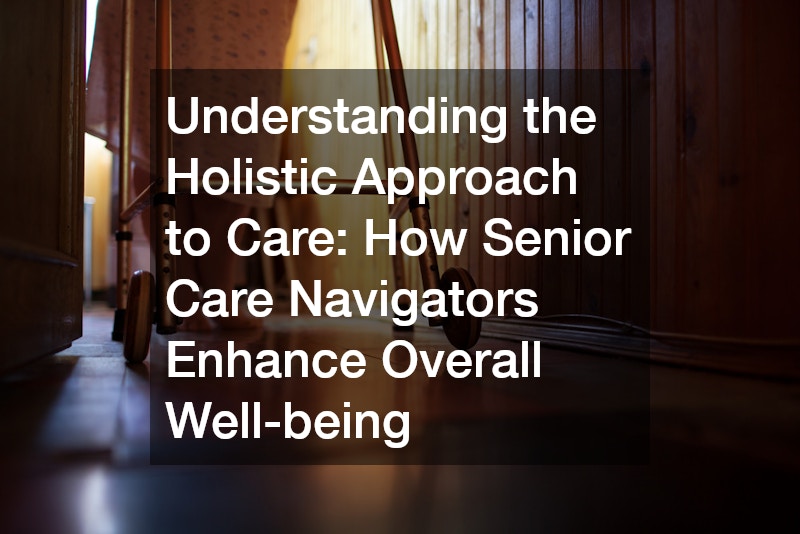End-of-life care is a critical phase that encompasses both emotional and practical challenges. One key player in facilitating this journey with grace and efficacy is the senior care navigator. These professionals act as a compass, guiding families through the intricate healthcare landscape to ensure their loved ones receive dignified care.
A senior care navigator provides expert insight into the benefits of professional guidance in end-of-life care. They bring a spectrum of resources and a wealth of experience, addressing the complex needs that arise during this time. Their objective is to empower families with the knowledge required to make informed decisions.
In this complex journey, senior care navigators prove invaluable by personalizing care plans, ensuring comfort, and effectively coordinating with healthcare providers. This article delves into how their role is integral to managing the multifaceted aspects of end-of-life care, from emotional to logistical, thus enhancing the overall experience for both patients and their families.
Understanding the Benefits of Professional Guidance in End-of-Life Care

Senior care navigators are adept at identifying the unique needs of each family, tailoring their guidance to match specific circumstances. Their expertise in hospice care and dementia care services empowers families by alleviating the stress of decision-making. They help bridge the gap between desired home care and the realities of healthcare system constraints.
Moreover, the presence of a senior care navigator ensures that all aspects of care are consistently aligned with the patient’s and family’s wishes. They facilitate communication, ensuring that families feel supported and involved at every step. This professional guidance is especially crucial in situations involving complex medical conditions, where decisions need to be made promptly and accurately without overwhelming the family.
How Senior Care Navigators Assist in Tailoring Care to Individual Needs
Personalized care is a hallmark of the services provided by senior care navigators. They possess the skill to dissect and comprehend the intricacies of each family’s situation. Equipped with this knowledge, they ensure care plans are tailored precisely to meet the individual needs and preferences of the patient and family.
This customization involves careful assessments and collaborations with immediate health care, addressing not only the medical needs but also the emotional well-being of the patient. Whether the emphasis is on hospice care or dementia care services, these professionals guarantee that all care components align with the patient’s specific condition and the family’s expectations.
Streamlining the Transition: A Senior Care Navigator’s Role in Hospital to Home Moves
The transition from a healthcare facility to home can be a daunting process fraught with logistical hurdles. Senior care navigators play an essential role in ensuring a smooth transition by coordinating every aspect of this move. They ensure that necessary medical equipment and services for in-home care are readily available upon discharge from a hospital or other healthcare facility.
In addition to logistical support, they also help families make necessary adjustments to the home environment by collaborating with home appraisers and other service providers. Working with a roofing company or garage building service, for example, ensures that the patient’s new environment is not only comfortable but also safe and conducive to recovery.
Coordinating with Healthcare Providers: The Senior Care Navigator’s Key Role
Effective coordination with healthcare providers is a cornerstone of a senior care navigator’s role. By acting as liaisons, they ensure continuity of care across different platforms and providers, bridging any communication gaps that might exist. This coordination is crucial in managing chronic conditions that require ongoing attention and specialist care.
Senior care navigators also assist in scheduling and attending healthcare appointments, providing clarity and support. They help families understand complex medical terminologies and treatment plans, ensuring they are fully informed and capable of making the best decisions for their loved ones. This advocacy is pivotal in achieving optimal patient outcomes.
Emotional Support: How Senior Care Navigators Help Families Cope with Hospice Decisions

The journey into hospice care is emotionally strenuous, and the role of a senior care navigator is pivotal in providing emotional support during this time. They are trained to offer empathetic guidance and listen to the concerns and fears of the families and patients. This support enables families to process their emotions and make decisions with clarity and confidence.
Senior care navigators offer support groups and resources to connect families with others going through similar experiences. These platforms provide a network of shared experiences that can ease the emotional burden of that crucial final phase of care. With this support structure in place, families can navigate the difficult journey of hospice care with the assurance that they are not alone.
Navigating Financial and Legal Aspects of End-of-Life Care with Expert Assistance
End-of-life care involves navigating complex financial and legal landscapes, a task made manageable by the expert assistance of senior care navigators. They provide crucial advice on insurance coverage, potential financial aid, and legal documentation necessary for end-of-life arrangements. This foresight ensures that all financial obligations are clear and managed appropriately.
Collaborating with legal advisors and financial planners, senior care navigators help families understand their rights and options. This collaborative effort ensures that all necessary legal documents, such as wills and powers of attorney, are in place, offering peace of mind to families. It also alleviates the stress associated with financial management during emotionally challenging times.
How Senior Care Navigators Ensure Comfort and Safety in Home-Based Care

Safety and comfort are paramount in home care, and senior care navigators ensure these priorities are met effectively. They work with families to evaluate home environments, recommending modifications and collaborating with home renovations experts to meet the needs of in-home care. This strategic planning ensures a safe and supportive living space for patients.
By providing expert advice on the necessary equipment and care services required within the home, senior care navigators tailor solutions that enhance patient comfort. Whether it’s coordinating with medical supply companies or arranging in-home health care services, their meticulous planning reduces risks and prevents complications that could arise from inadequate home setups.
The Importance of Customizing Care Plans for Families in Hospice Situations
Customized care plans are critical in hospice situations, where unique and sensitive needs must be addressed compassionately. Senior care navigators excel in crafting these personalized care plans, considering not only medical requirements but also the emotional and spiritual aspects of end-of-life care. This holistic approach ensures comprehensive support tailored to each family’s journey.
By involving the family in the planning process, senior care navigators ensure that every aspect of the plan aligns with the patient’s values and the family’s wishes. This involvement fosters a sense of control and participation, providing families with peace of mind knowing their loved one’s care plan is respectful and considerate of their preferences.
Managing Chronic Conditions at Home: The Senior Care Navigator’s Role in Support
Senior care navigators play an essential role in managing chronic conditions at home, ensuring that patients receive consistent, high-quality care. They work closely with healthcare providers to devise plans that address ongoing medical needs, adjust care protocols, and anticipate potential complications. This proactive management reduces emergency interventions, maintaining steady and reliable home care.
Collaborating with specialists and care teams, senior care navigators guarantee that treatment plans are implemented correctly and that caregivers are equipped with the necessary skills. Whether managing diabetes, heart conditions, or complex neurological disorders like dementia, their expertise ensures all aspects of the patient’s health are coordinated seamlessly.
How Senior Care Navigators Facilitate Communication Between Family and Healthcare Teams
Communication between families and healthcare teams is vital for providing effective care, and senior care navigators serve as essential connectors in this process. They help decode complex medical information and ensure that families are well-informed about their loved one’s health status and treatment options. This clarity enables families to participate actively in care decisions and advocate effectively for their loved ones.
Senior care navigators also coordinate regular discussions between healthcare providers and families, addressing concerns promptly and ensuring that all parties remain aligned with the care objectives. This level of engagement fosters trust and cooperation, enhancing the overall quality of care and patient satisfaction.
Moreover, by maintaining open lines of communication, these professionals can quickly adapt care strategies in response to changing needs or circumstances, ensuring continuity and consistency. Their role as communication facilitators is therefore crucial in aligning expectations, managing transitions, and ensuring comprehensive care management.
Creating a Comfortable Home Environment: The Senior Care Navigator’s Impact on Living Spaces
Creating a comfortable home environment is fundamental to effective in-home care, and senior care navigators are instrumental in achieving this goal. They advise on home modifications, working with service providers to create safe, adaptive living environments suited to the patient’s needs. This often involves collaborations with home appraisers, contractors, and even landscaping services to achieve optimal living conditions.
This attention to detail ensures that patients can navigate their homes safely and comfortably, addressing any physical limitations they may have. Such transformations enable individuals to maintain their independence and dignity while receiving the care they need within the comfort of their own homes.
Additionally, senior care navigators can recommend particular enhancements, such as appropriate lighting or mobility aids, which significantly impact the quality of life. By taking these proactive measures, they ensure that the home becomes a sanctuary that supports both the physical and emotional well-being of patients and lifts the burden from their families.
Empowering Families: Education and Resources Provided by Senior Care Navigators
Education and access to resources are critical tools that senior care navigators use to empower families in their caregiving roles. By providing valuable information about hospice care, in-home care services, and managing chronic illnesses, they help families understand and navigate the complexities involved in end-of-life care.
Senior care navigators also curate and share educational materials tailored to the family’s specific needs. They conduct workshops or offer one-on-one sessions to address any questions or concerns, ensuring that families feel confident and supported throughout the caregiving process. These resources are invaluable in helping families make informed decisions that align with their loved ones’ preferences and values.
Additionally, they connect families with local support groups and community resources, providing a network of support that extends beyond medical needs. This holistic approach to caregiving support reinforces the family’s ability to provide compassionate and competent care, ultimately enhancing the quality of life for both the patient and their caregivers.
Understanding the Holistic Approach to Care: How Senior Care Navigators Enhance Overall Well-being

Senior care navigators endorse a holistic approach to end-of-life care, prioritizing not just the physical but also the emotional, social, and spiritual well-being of patients. Integrating these elements into care plans helps improve quality of life and ensures comprehensive care. This approach involves facilitating complementary therapies, counseling, and spiritual support as part of the care strategy.
These professionals recognize that well-being encompasses a broad range of needs spanning beyond mere medical treatment. By coordinating with mental health professionals, spiritual advisors, and community services, they create an intertwined network of support that addresses the full spectrum of patient and family needs.
The holistic care model endorsed by senior care navigators leads to more meaningful support environments where patients feel valued and respected. This model reduces stress, alleviates symptoms of anxiety or depression, and enhances overall patient satisfaction during their end-of-life journey, reflecting the profound impact of holistic care on well-being.
Conclusion
In conclusion, senior care navigators play an indispensable role in the landscape of end-of-life care. Their multifaceted approach—from personalizing care to facilitating communication and coordinating home modifications—ensures that patients receive compassionate and competent care suited to their unique needs. Through their expertise, they bridge the gap between medical care and family needs, offering an invaluable source of support, education, and empowerment.
The assistance senior care navigators provide extends beyond logistical planning; it reaches into the very essence of human connection, ensuring that individuals and their families journey through the final phases of life with dignity, peace, and respect. Their work touches all aspects of care, offering practical solutions and emotional support, thereby transforming the end-of-life care experience.
Ultimately, the presence of senior care navigators enhances the quality of hospice care, strengthens in-home care setups, and assures families that they are not navigating this challenging journey alone. Their commitment to service underscores the importance of professional guidance in the pursuit of dignified and holistic end-of-life care.


